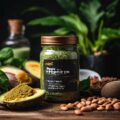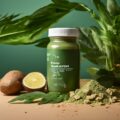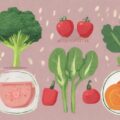The Power of Protein: Nourishing Your Body and Soul
Protein is more than just a nutrient – it’s a building block for a vibrant, energetic life. When we think about high-protein foods, let’s shift our perspective from simply ‘hitting macros’ to nourishing our bodies with compassion and intention. This guide will explore the wonderful world of protein-rich foods, not just for their nutritional benefits, but for how they can support our overall wellbeing and connection to ourselves and the world around us.
Embracing Plant-Based Protein Sources
As we become more conscious of our impact on the planet and our fellow creatures, many are turning to plant-based protein sources. These foods not only provide the amino acids our bodies need but also connect us to the earth in a beautiful way:
- Lentils and Beans: These humble legumes are protein powerhouses, offering a comforting and grounding energy to our meals.
- Quinoa: An ancient grain that nourishes both body and spirit, quinoa is a complete protein source.
- Nuts and Seeds: From almonds to pumpkin seeds, these little nuggets of nutrition offer protein along with healthy fats and minerals.
- Tofu and Tempeh: Versatile soy products that can be prepared in countless delicious ways, supporting both our health and the environment.
By incorporating these plant-based proteins into our diets, we’re not just feeding our bodies – we’re making a compassionate choice that ripples out into the world.
The Gentle Approach to Animal Proteins
For those who include animal products in their diet, approaching these protein sources with mindfulness and gratitude can transform the way we eat:
- Eggs: A versatile protein source, eggs can be a beautiful way to start the day when sourced from happy, free-range hens.
- Fish: Rich in protein and omega-3 fatty acids, choosing sustainably caught or farmed fish allows us to nourish ourselves while respecting marine ecosystems.
- Poultry: When incorporating chicken or turkey, opt for free-range and organic options when possible, honoring the lives that sustain us.
- Dairy: Greek yogurt, cottage cheese, and milk offer protein along with calcium. Choosing organic or local dairy can support both our health and small-scale farmers.
By being mindful of where our animal proteins come from and choosing ethical sources, we can enjoy these foods with a clear conscience and a grateful heart.
Protein for Every Lifestyle
No matter your dietary preferences or restrictions, there are protein-rich options to support your wellbeing:
- For Vegans: Combine various plant proteins throughout the day to ensure you’re getting all essential amino acids.
- For Those with Allergies: If you’re allergic to soy or nuts, focus on seeds, legumes, and gluten-free grains like quinoa and amaranth.
- For Athletes: Consider a mix of plant and animal proteins to support muscle recovery and growth, always listening to your body’s needs.
- For Busy Lifestyles: Keep hard-boiled eggs, Greek yogurt, or trail mix on hand for quick, protein-rich snacks.
Remember, the best protein sources are those that make you feel good – both physically and emotionally.
Mindful Protein Consumption
As we incorporate more protein into our diets, it’s important to do so mindfully:
- Listen to your body’s hunger and fullness cues
- Enjoy your meals slowly, savoring each bite
- Express gratitude for the nourishment you’re receiving
- Consider the journey your food has taken to reach your plate
- Share protein-rich meals with loved ones, fostering connection and community
By approaching our protein consumption with awareness and appreciation, we transform the act of eating into a nourishing ritual for body and soul.
Frequently Asked Questions
1. How much protein do I really need?
The amount of protein you need depends on factors like your age, activity level, and overall health. Generally, most adults need about 0.8 grams of protein per kilogram of body weight daily. However, it’s less about hitting an exact number and more about listening to your body and providing it with nourishing foods that make you feel energized and satisfied.
2. Can I get enough protein on a plant-based diet?
Absolutely! A well-planned plant-based diet can provide all the protein you need. By including a variety of legumes, whole grains, nuts, seeds, and vegetables, you can easily meet your protein requirements while also benefiting from the wide array of nutrients these foods offer.
3. Are protein powders necessary?
Protein powders aren’t necessary for most people, as whole foods can provide all the protein we need. However, they can be a convenient option for some, especially very active individuals or those struggling to meet their protein needs through diet alone. If you choose to use protein powder, opt for high-quality, minimally processed options.
4. How can I add more protein to my meals without eating meat?
There are many delicious ways to boost protein without meat. Try adding lentils or beans to soups and salads, sprinkling nuts and seeds on your morning oatmeal, using hummus as a spread or dip, incorporating tofu or tempeh into stir-fries, or enjoying Greek yogurt with fruit for a protein-rich snack.
5. Is it better to get protein from plants or animals?
Both plant and animal proteins can be part of a healthy diet. The best choice depends on your personal health needs, ethical considerations, and what makes you feel your best. Many people find that a mix of both works well, while others thrive on plant-based proteins. The key is to choose high-quality sources and to eat with mindfulness and gratitude, regardless of the origin of your protein.
Remember, nourishing your body with protein is an act of self-care and love. By choosing foods that align with your values and make you feel good, you’re not just feeding your body – you’re nurturing your whole self. Embrace the journey of discovering which protein sources resonate with you, and enjoy the vibrant health and energy that comes from mindful, compassionate eating.









